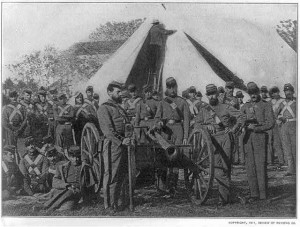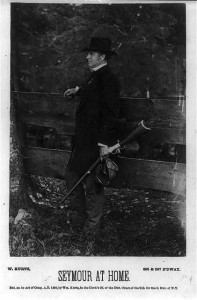… Governor wants to cut red-tape
New York was not mentioned in President Lincoln’s call for 100,000 militia to help stave off the Confederate invasion, but somehow or another New York authorities got the word[1]. In a repeat of the hurry-up deployment of April 1861, when Washington, D.C. was shored up after Fort Sumter, 150 years ago today New York militia (National Guard) units were rapidly preparing to go to Harrisburg, Pennsylvania to help defend the Keystone State. One catch – a lack of uniforms.
From The New-York Times June 18 1863:
THE MOVEMENT OF NEW-YORK TROOPS.; Troops Ordered to March. Departure of the Seventh New-York State Militia. THE PENNSYLVANIA INVASION. Departure of the Eighth and Seventy-First Regiments. Other Regiments Preparing to Depart. Rally Call from Col. Bendix. The Anticipated Conference Between Gov. Seymour and the Military Generals of this City. Brookly[n] Military Affairs.
Maj.-Gen. SANDFORD has detailed the Seventh, Eighth, Eleventh, Twenty-second, and Thirty-seventh regiments, under Brig.-Gen. HALL, and the Fifth, Sixth, Twelfth, Sixty-ninth, and Seventy-first regiments, under Brig.-Gen. YATES, to proceed forth-with to Harrisburgh, to report there to Maj.-Gen. COUCH, commanding the Department. He also proposes to send 500 artillerists of the Fourth regiment, National Guard, if Gen. COUCH can furnish guns, horses, and ca[???]ssons.
The regiments are embarking as rapidly as transportation and supplies can be furnished.
Early yesterday morning, the Armory of the Seventh Regiment N.Y.S.M., N.G., was the scene of much excitement and enthusiasm. This arose from the fact that this crack corps was to leave that morning at 7 o’clock for Harrisburgh, to report to Gen. COUCH. The large rooms of the building were crowded to suffocation with friends and relatives of the members. When on parade before marching, the appearance of Col. LEFFERTS among his men was the occasion for much enthusiasm, and he was warmly and enthusiastically greeted. When all the necessary preliminaries had been completed for their starting, they ma[r]ched from the Armory at 10 o’clock, their route being from the Armory to Fourth-street, down Broadway to Pier No. 1, where a boat was in deadness to convey them to Amboy, where they are to take the cars[???]en route to Harrisburgh.
They met with the hearty congratulations of the people in Broadway as they passed along, headed by their regimental band. The morning was unfavorable, which, however, did not prevent the enthuiasm which was manifested towards them on the occasion. …
The memorable scenes connected with the first hurried departure of the Eighth and Seventy-first regiments for the se[???]t of wars were repeated last evening, under circumstances of even heightened interest. The same alacr[???]ty which inspired our citizen-soldiers to rush to the defence of the Capital in 1861, is manifested in 1863. The same armories were busy with the hum of preparation, and crowded with the collection of sympathizing friends, bidding the braves God-speed on their patriotic errand. There was the same bustle and confusion; the same excited officers, bothered Quartermasters, pestered Captains, tormented Lieutenants, and troubled Sergeants, overrun with the manit[???]d duties of the hour; the same free and easy privates, ready to go at a moment’s warning, with kna[???]sack, and blanket, and musket, and equipments, and all the “traps” that the old camp[???]igner knows so well how to prepare t[???]r the [???]trving hours of the picket, the camp, the bivouack, and the battle-field. And there was t[???]e same red tape, too, dampening the ardor of the me[???] more by dull delay than could all the dreariness of the despicable weather. The same red tape that o[???] the first occasion kept postponing the hour of departure, for the want of necessary supplies, was visit [???]e on this occasion, disheartening the many, and dragging out long hours of painful goodbyes. The streets in the vicinity of Centre Market were thr[???] aged throughout the day and night with the puzzled soldiers, hurrying hither and thither under orders to [???] in readiness to leave at any moment. And then there was that uncertainty about the hour for starting that kept so many sisters and mothers for hours standing in the wet streets, to give the last fond adieu as the loved ones marched off to repel the ruthless invader of our peaceful Northern homes. It is a sad, as well as a joyous, sight to see the departure of any regiment on such a noble errand, but, more particularly do the surroundings of our citizen soldiers ca[???] forth these conflicting emotions. Their ranks are always filled with men, who, though their lives a[???] none the more valuable than the lives of other soldiers, and whose social ties are none the stronge[???], have nevertheless made greater sacrifices for the cause in which they enlist than those who, [???]oting with more deliberation, can make every arrangement in anticipation of the worst that may befall them. They go, as it were, almost like the minute men, at the signal gun, and the pecuniary and other sacrifices which they make are it calculable. Many are reared in homes of ease and luxury, and are little used to the rough fare that greets the soldier in active service. Their ready response to the call of duty, therefore, heightens the admiration of their fellow-citizens, and there can be no wonder that they are attended on their departure with the cheering best wishes of troops of friends. Each regiment, as it passed from its armory — the Eighth about 7 P.M. and the Seventy-first after 10 P.M. — was enthusiastically cheered, and received an ovation as it passed down Broadway en route for the seat of war in Pennsylvania. It was not their fault that they did not go sooner, but now that they have gone, they will add to the army of the Union twelve hundred as stout hearts as ever beat beneath the breastplate of a soldier. We give the name of the officers — wishing that the names of the privates, as well, were accessible, that they might together be perpetuated by the historian who shall do justice to the rank and file of the army of the Republic. …
The City regiments will remain in service but for a short period — until the regular force can be thoroughly organized for the new work of repelling the rebels’ see [???]nd invasion of the loyal States. Let us hope to soon welcome their, safe and triumphant return. …
THE FIFTH, SIXTH, ELEVENTH, TWELFTH, THIRTY-SEVENTH AND SEVENTY-FIRST TO GO TO-DAY.
Besides the regiments which left the city yesterday, all the regiments of the First Divison, N.Y.N.G., were busy during the day in making preparations for immediate departure. A telegram was received from Gov. SEYMOUR, by Maj.-Gen. SANDFORD, yesterday morning, directing him to send the entire First Division to Harrisburgh “forthwith.” Gen. SANDFORD replied that 2,000, then were then ready to start, but the Government authorities had no uniforms and clothing provided for them. Gov. SEYMOUR answered immediately that “red-tape must be cut when a sister State is in danger,” and directing him to draw for uniforms and camp equipage on the State Quarter-master General, and for arms on the Commissary General. It is said that the State officers can furnish 10,000 uniforms and 20,000 muskets immediately if required. Gen. SANDFORD forthwith made requisition on these officers, and it is expected that nearly all the regiments of the First Division will be ready for departure to-day. …
None of the regiments took their departure for Harrisburgh yesterday, the cause being lack of uniforms and accoutrements, which could not be procured from the Quartermaster’s office in New-York.
All the regiments are anxious to be off at the earliest practical moment.
The image of Harrisburg was published in the July 18, 1863 issue of Harper’s Weekly hosted at Son of the South.
- [1]I just found out that according to the June 16, 1863 issue of The New York Times Governor Seymour received a telegram from Washington on June 15th requesting 20,000 militia men immediately↩



